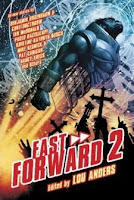So, if you haven’t heard the news, or seen Andrew Wheeler’s rundown, yesterday was publishing’s “Black Wednesday,” with layoffs and changes at Random House, Thomas Nelson, Simon & Schuster, Houghton Mifflin Harcourt, others. Prompting in part this good advice from John Scalzi:
Buy some damn books.
Fortunately, this advice is well-timed: Books are inexpensive yet valued objects, which means that they make lovely gifts for whatever holiday festivities you subscribe to this time of year. Now is a fine time to introduce friends and loved ones to some of your favorite authors — and in doing so, you’re boosting that author’s sales, which will make his or her publisher marginally less liable to dump their shivering ass onto the street. You’re giving a gift a loved one will appreciate, you’re doing your favorite authors a favor, and you’re doing your part to keep editors and publishers from hurling themselves out of high-rise windows. Truly, everybody wins.
So, go: Make this a bookish holiday season. You know you want to anyway. I, my fellow authors and a grateful publishing industry thank you in advance for your cooperation, and for your seasonal purchases.
Amen.
For our part, my wife and I have decided to give everyone books and bookstore gift cards this Xmas. It has the added bonus of making our shopping really quick and easy too.

 Pyr has
Pyr has 


